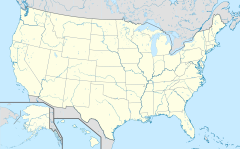Overmountain Victory National Historic Trail
| Overmountain Victory National Historic Trail | ||
|---|---|---|
| View from Roan Mountain | ||
|
|
||
| Location: | Virginia , Tennessee , North Carolina , South Carolina , United States | |
| Specialty: | Historic route in the American Revolutionary War | |
| Next city: | Elisabethton , Tennessee | |
| Length: | 530 | |
| Schematic map of the area | ||
The Overmountain Victory National Historic Trail is a historic route in the US states of Virginia , Tennessee , North Carolina, and South Carolina . The trail follows the route on which pioneers, known as Overmountain Men during the American Revolutionary War in 1780 , who lived in the west of the Appalachians , i.e. beyond the mountains, marched as patriotic militias on the battlefield at Kings Mountain in what is now Kings Mountain National Military Park .
The route was added to the National Trails System in 1980, which extends , preserves and protects trails of particular national importance, beauty or history by the federal government. The trail network is around 530 kilometers long, including a 110-kilometer secondary route that joins the main route from Elkin at Morganton . It consists of two types: a long-distance hiking trail , which is still under construction, and a commemorative motor route , which mainly runs on federal and state roads and follows the historic route of the Overmountain Men on some sections.
Only a little over 90 kilometers of hiking trails have officially been expanded for use by the public so far, and further expansion is being pushed ahead. The existing sections came about through agreements with the landowners and often have multiple names. The official routes are marked by signs with the logo of the trail, the silhouette of an overmountain man on a brown and white triangle or a white triangular flame.
The Overmountain Victory National Historic Trail is a collaborative effort by the National Park Service , the U.S. Forest Service , the U.S. Army Corps of Engineers , the Overmountain Victory Trail Association, local authorities, residents, local history societies, and the states of Virginia, Tennessee, North Carolina and South Carolina emerged.
course
The trail follows the historic route from Abingdon in Virginia to today's Tennessee and over the Watauga River to Sycamore Shoals in today's Elisabethton . From there it runs along the Doe River up into the mountains and to Roan Mountain , and after the steep climb over the ridge of the Great Smoky Mountains in Tennessee and North Carolina to Kings Mountain in South Carolina. The battlefield there is designated as Kings Mountain National Military Park .
history
In anticipation of the 200th anniversary of the 1776 Declaration of Independence and the 200th anniversary of the Battle of Kings Mountain, many citizens of the five states on the original route remembered the route and hiked the sections of the Appalachian trails and highways leading to the historical route from 1780, along to the battlefield at Kings Mountain. Hikers, those interested in military history and boy scouts followed this famous route many times, and it was also the scouts from Elisabethton who were the first to repeat the entire march of the Overmountain Men from Elisabethton to Kings Mountain in 1975 and there by Vice President Nelson Rockefeller with a ceremony on the battlefield, what is now Kings Mountain National Military Park, near Blacksburg .
Many of the hikers and local residents later asked for the route to be recognized by the state as a National Historic Trail , analogous to the route taken by the patriotic Minutemen in the Battle of Lexington and Concord during the American Revolution . The supporters of this initiative worked with the representatives of other American routes together to create the now known as the National Trails System path network and laid later the United States Congress a petition for recognition of the trail before. The Overmountain Victory National Historic Trail was declared a National Historic Trail in September 1980 and a little later by President Jimmy Carter - in recognition of the historical significance of the march of the border residents over the Appalachians for the British at the Battle of Kings Mountain - by federal law to the Overmountain Victory National Historic Trail declared. The first historic long-distance route in the eastern United States was established exactly 200 years after the event it commemorates.
Individual evidence
- ↑ Overmountain Victory National Historic Trail (US National Park Service)
- ^ Overmountain Victory Trail Association


